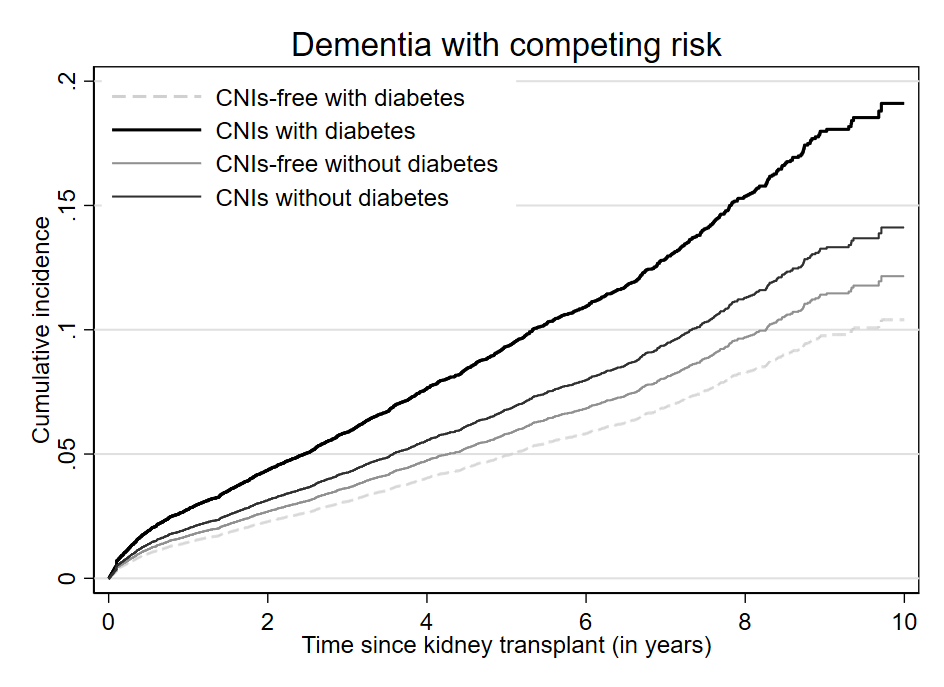Post-Kidney Transplant Dementia Risk by Modifiable Risk Factors and CNIs Among Older Recipients
1Johns Hopkins School of Medicine, Baltimore, MD, 2Surgery, Saint Louis University, O Fallon, IL, 3Drexel University School of Medicine, Philadelphia, PA, 4Saint Louis University, St. Louis, MO, 5Johns Hopkins University, Baltimore, MD
Meeting: 2022 American Transplant Congress
Abstract number: 1386
Keywords: Calcineurin, Elderly patients, Kidney transplantation, Risk factors
Topic: Clinical Science » Kidney » 37 - Kidney Immunosuppression: Induction Therapy
Session Information
Session Name: Kidney Immunosuppression: Induction Therapy
Session Type: Poster Abstract
Date: Monday, June 6, 2022
Session Time: 7:00pm-8:00pm
 Presentation Time: 7:00pm-8:00pm
Presentation Time: 7:00pm-8:00pm
Location: Hynes Halls C & D
*Purpose: Up to 17% of older recipients develop dementia after kidney transplant (KT). While there are known modifiable risk factors for dementia among community-dwelling older adults, it is unclear whether Calcineurin Inhibitors (CNIs) are a KT-specific modifiable risk factor.
*Methods: We identified 28,901 KT recipients (aged 55 and above) using data from the United States Renal Data System. We estimated the risk of post-KT dementia associated with CNIs and modifiable risk factors (education, obesity, history of diabetes, hypertension and depression) using competing risk analysis accounting for transplant center-level variation. Models incorporated inverse probability weighting to adjust for confounders.
*Results: The 10-year cumulative incidence of post-KT dementia was 12.0% for recipients on a CNIs-free regimen and 16.9% for others treated with CNIs. Tacrolimus (sHR, 1.46; 95% CI, 1.10 to 1.94) and cyclosporin (sHR, 1.54; 95% CI, 1.08 to 2.14) regimens were equally associated with an increased risk of incident dementia (pinteraction=0.22). The magnitude of the dementia risks associated with CNIs were similar to what we observed for hearing loss (sHR, 1.36; 95% CI, 1.07 to 1.73), history of diabetes (sHR, 1.30; 95% CI, 1.11 to 1.51) and no education (sHR, 1.47; 95% CI, 1.00 to 2.15) but lower than what we observed for pre-KT depression (sHR, 2.45; 95% CI, 2.13 to 2.83); no other modifiable risks factors were identified (Table). The association of CNIs with post-KT dementia differed significantly by history of diabetes (pinteraction=0.03); stronger association was seen among recipients with diabetes (sHR, 2.10, 95% CI, 1.35 to 3.26) than those without (sHR, 1.13, 95% CI, 0.75 to 1.64).
*Conclusions: CNIs were associated with higher post-KT dementia risk regardless of agent; these risks were comparable or stronger than what we observed for other traditional modifiable risk factors. Personalized IS regimens, particularly among recipients with diabetes may be needed to prevent post-KT dementia.
| Crude sHR (95% CI) | Ajusted sHR (95% CI) | ||
| Hypertension | 1.02 (0.87, 1.20) | 1.00 (0.85, 1.18) | |
| Pre-KT Depression | 2.37 (1.06, 2.72) | 2.45 (2.13, 2.83) | |
| Pre-KT Hearing Loss | 1.45 (1.14, 1.86) | 1.36 (1.07, 1.73) | |
| Diabetes | 1.37 (1.25, 1.50) | 1.30 (1.11, 1.51) | |
|
No education (Reference: College education)
|
1.42 (0.96, 2.10) | 1.47 (1.00, 2.15) | |
| CNIs-Tacrolimus | 1.42 (1.07, 1.88) | 1.46 (1.10, 1.94) | |
| CNIs-Cyclosporine | 1.47 (1.05, 2.08) | 1.54 (1.08, 2.14) |
To cite this abstract in AMA style:
Chen Y, Ahn J, Chu N, Bae S, Schnitzler MA, Hess G, Lentine K, Segev D, McAdams-DeMarco M. Post-Kidney Transplant Dementia Risk by Modifiable Risk Factors and CNIs Among Older Recipients [abstract]. Am J Transplant. 2022; 22 (suppl 3). https://atcmeetingabstracts.com/abstract/post-kidney-transplant-dementia-risk-by-modifiable-risk-factors-and-cnis-among-older-recipients/. Accessed February 22, 2026.« Back to 2022 American Transplant Congress

